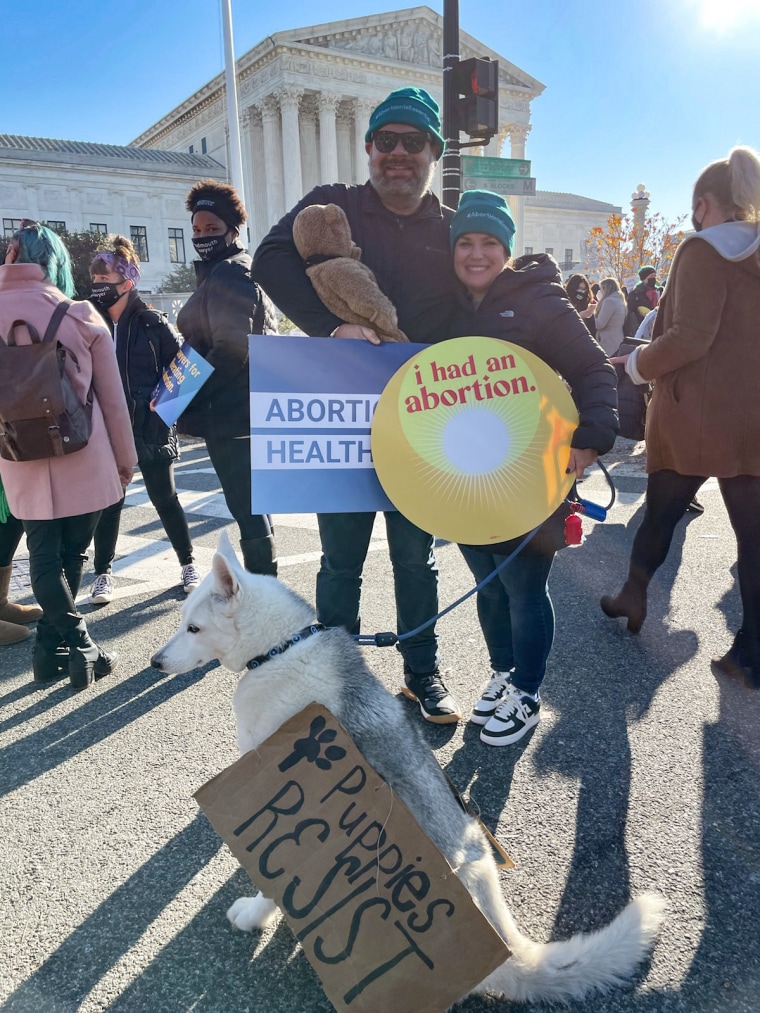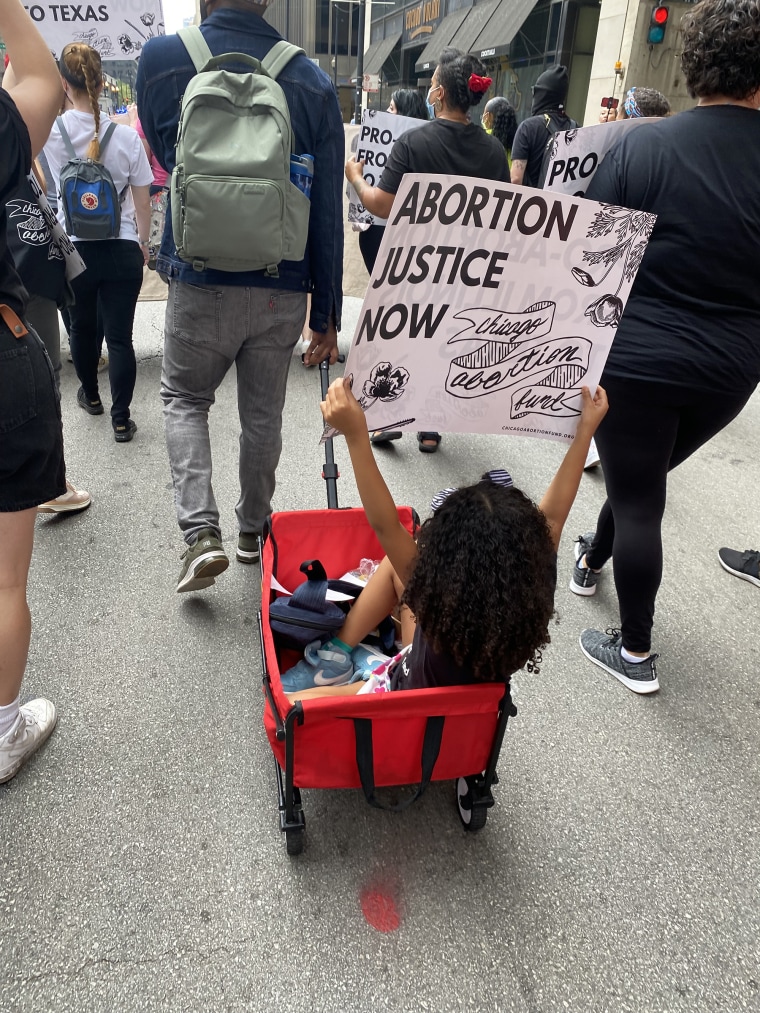Bethany VanKampen Saravia, a 39-year-old new mom to a 3-month-old daughter, never considered the possibility that she would spend the last day of her maternity leave at a rally in front of the United States Supreme Court.
"I did not anticipate it, but we're here for it," VanKampen Saravia tells TODAY Parents. "I'm really excited to be there with my daughter and to also have my husband with me — to stand as a family for the first time at the steps of the Supreme Court and just have our voices heard with the thousands of people who are going to be there."
This week, as the Supreme Court begins hearing oral arguments in Dobbs v. Jackson Women’s Health Organization — a case centering on a Mississippi anti-abortion law that bans abortion care after 15 weeks of pregnancy — moms like VanKampen Saravia are showing up at rallies and peaceful protests across the country with their children in tow. Their hope is to be a visual reminder of who they say is harmed most when abortion access is limited or taken away entirely.
In its current case, Mississippi has also requested that the court overturn Roe v Wade and Planned Parenthood v. Casey — two pivotal rulings that reaffirmed the constitutional right to abortion care. If the Supreme Court rules in favor of the law and overturns Roe, at least 18 states have laws that would automatically ban abortion care entirely, according to the Kaiser Family Foundation.
VanKampen Saravia, a senior legal advisor for Ipas, an international, non-governmental organization working to expand access to abortion and contraception, was a teenager when her own mother shared the story of her abortion, which happened prior to Roe v. Wade.
"Her mother brought her to a house at night, and the man who performed her abortion told her that she couldn't make any noise because he had neighbors," VanKampen Saravia said. "My mother was scared, and her abortion was a secret from nearly everyone she knew for many years. She was forced into silence."
VanKampen Saravia says that she does not want the same for her daughter.
"My mother shared her story with me because she wanted me to know that I could come to her and that it was OK for me to share my story with her," she adds. "That's what I want for my daughter. I want her to know that she is surrounded by people who have had abortions, (including) her mother, her grandmother...I want her to know that she is loved by people who have had an abortion."

Rana Barar, a 46-year-old California mom of two kids, ages 16 and 20, says that the last trip she took before the pandemic was a March 2020 rally in front of the Supreme Court in Washington, D.C. "A friend of mine and I both took our daughters," she adds. "The only reason why my son didn't also come was because he was a freshman in college at the time."
Barar had an abortion when her children were 10 and 14, and says that being the best parent she could be for her kids factored into her decision to not carry that pregnancy to term. She isn't alone. A reported one in four women will have at least one abortion in their lifetime, and the majority of people who seek abortion services already have at least one child at home. A reported 74% of women seeking abortion services say having another child will interfere with their ability to care for the dependents they already have, while nearly one in 10 said they had an abortion because they had already completed their families.
"Abortion is not a 'woman only' issue," Barar tells TODAY. "It's not just an issue for people who have uteruses. It's an issue for everyone, and that includes the families that are affected by limited or eradicated access to abortion care."
Barar says that while she cannot take her daughter to one of the planned demonstrations in Washington, D.C. this time ("In-person school feels very, very precious now," she explains), she'll continue to be honest with her children.
"Both of them are going to have to talk to their partners about how to approach their reproductive lives," Barar said. "Taking them to demonstrations, for me, is part of their education."
It's an issue for everyone, and that includes the families that are affected by limited or eradicated access to abortion care.
Maleeha Aziz, 28, has exposed her 2-year-old daughter to four abortion-related events since she was born, including a Congressional hearing in which Aziz testified and shared her own abortion story.
"I actually left her with family when I testified and she watched her mom on TV," she adds. "She just saw her mom on a screen, but I have video of her watching me and when she's older I'm going to show it to her and I'm going to tell her exactly what that was about."
A community organizer for the Texas Equal Access Fund, a non-profit that helps provide financial support to those seeking abortion care, Aziz plans to continue to involve her daughter in her advocacy work, regardless of what the Supreme Court decides in Dobbs v. Jackson Women’s Health Organization.
It's work she believes her daughter will have to continue.
"I hope that when my daughter is older she’s not having to do this — that she’s not having to fight like this just for basic autonomy and human rights," Aziz tells TODAY. "But if that’s the case...I hope that she has all the tools, resources and she has learned from my experience so she can do it even better when she’s older. That she knows what we’ve tried, how we’ve failed, what she can learn from our failures, our achievements, or successes, build on it, and do it even better for the people she loves and for her community."
I just hope that throughout all of this, they see and understand that it’s our responsibility to take care of each other no matter what happens.

Making abortion advocacy work more accessible to parents is important to Megan Jeyifo, a 38-year-old mom to 6-year-old twins and Executive Director of the Chicago Abortion Fund, a non-profit organization that provides medical referrals, funds to low-income people seeking abortion services and free babysitting at events.
Jeyifo says that her twins are upset they couldn't come with her and her husband to the demonstrations this week in Washington.
"They asked us... 'Are you going to win?'" she said. "I want to say that I believe that we will win, but that feels really hard right now. I just hope that throughout all of this, they see and understand that it’s our responsibility to take care of each other no matter what happens. That it’s our responsibility to care for other people even when we don’t know who they are."
Related:

